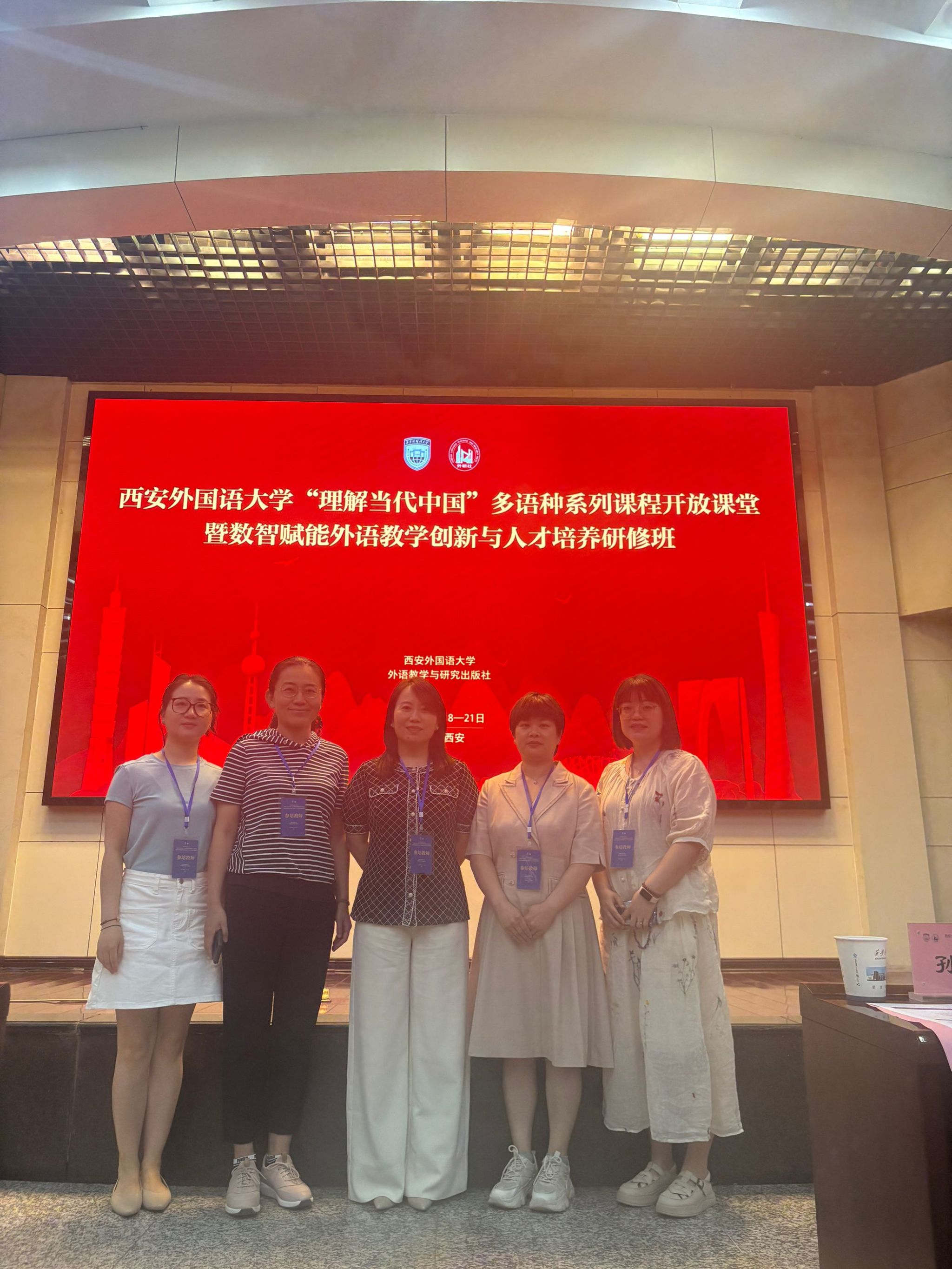On May 18, 2025, faculty members of the School of English Language and Culture at Xi’an Fanyi University convened at Xi’an International Studies University to engage in a work seminar focusing on the implementation of the “Three-Entries” initiative (the Three-fold Promotion of Xi Jinping Thought on Socialism with Chinese Characteristics for a New Era into textbooks, classrooms and minds) for foreign language disciplines in higher education. Centered on the theme of educational transformation for foreign languages in the new era, the seminar delved into strategies for improving students’ competence in spreading Chinese discourse through systematic integration of the “Three-entries” initiative.
I. Multifaceted Agenda Fosters Insightful Discourse, Orienting Educational Strategy
The seminar comprised a structured program of activities. Following the opening ceremony, Dr. Sun Youzhong, Director of Beijing Foreign Studies University, delivered the keynote address Deepening the “Three Entries” Initiative to Advance Educational Powerhouse Construction, underscoring its profound strategic significance. He highlighted the critical issue of “lacking Chinese discursive pillars” in contemporary foreign language education, whereby students exhibit proficient linguistic skills but lack the capacity to articulate Chinese concepts or engage in international discourse, resulting in what he termed as the “advanced communicative deficit” phenomenon. Dr. Sun advocated for a paradigm shift in foreign language education from the “linguistic tool paradigm” to the “civilizational dialogue paradigm,” achieving the dual objectives of “comprehending China” and “engaging the world” through curriculum-based ideological and political education, while cultivating cross-cultural professionals with both patriotic commitment and global competence.
The integration of digital intelligence emerged as a pivotal theme. Professor Cheng Wei presented a keynote report on Digital Intelligence Empowerment in “Three Entries” Pedagogy, while Professor Jin Limin shared insights on Digital Tools in Teaching “Understanding Contemporary China” Public Speaking Courses, exploring technological innovations for enhancing “Three-fold Integration” pedagogical practices. Additional sessions included Professor Zhu Qiang’s discourse on Institutional Characteristic-based Curriculum Design for “Understanding Contemporary China” Textbooks, a comprehensive resource development report by Foreign Language Teaching and Research Press, and interactive teaching demonstrations and evaluations, collectively offering multidimensional perspectives on innovative implementation strategies.
The integration of digital intelligence emerged as a pivotal theme. Professor Cheng Wei presented a keynote report on Digital Intelligence Empowerment in “Three Entries” Pedagogy, while Professor Jin Limin shared insights on Digital Tools in Teaching “Understanding Contemporary China” Public Speaking Courses, exploring technological innovations for enhancing “Three-fold Integration” pedagogical practices. Additional sessions included Professor Zhu Qiang’s discourse on Institutional Characteristic-based Curriculum Design for “Understanding Contemporary China” Textbooks, a comprehensive resource development report by Foreign Language Teaching and Research Press, and interactive teaching demonstrations and evaluations, collectively offering multidimensional perspectives on innovative implementation strategies.
II. Defining Core Tenets, Establishing Pedagogical Frameworks
Dr. Sun Youzhong articulated three fundamental principles for “Three Entries” pedagogy.
The Three-Tiered Proficiency Ladder: Progress from precise multilingual translation of key concepts (e.g., “Community with a Shared Future for Mankind”) to deep comprehension of ideological frameworks (e.g., Chinese-style governance concepts), culminating in advanced narrative capabilities in competitive global discourse environments.
Trinity Integration Model: In the Understanding Contemporary China curriculum series, achieve organic integration of value cultivation (e.g., promoting civilizational mutual learning), interdisciplinary knowledge dissemination (e.g., Chinese-style modernization), and competency development (e.g., international public opinion analysis).
Three-Narrative Approach: Encourage pedagogical integration of localized narratives (e.g., Xi’an cultural heritage), disciplinary-specific cases (e.g., legal profession’s “digital courtroom” applications), and national strategic initiatives (e.g., China-Africa hybrid rice cooperation), enabling students to construct nuanced representations of China through foreign languages.
III. Demonstrating through Case Studies
Dr. Sun showcased exemplary practices from multiple institutions, illustrating the tangible outcomes of “Three Entries” initiative.
Changji University students produced English-language short films on Kashgar Ancient City, leveraging cultural elements like Uyghur traditions and the opening narrative “Experience China’s Magnitude Through Xinjiang,” effectively conveying national identity. Northeast Forestry University law students created English skits depicting “AI-driven digital courtrooms,” translating disciplinary knowledge into compelling international communication content. Beijing Foreign Studies University students won international communication awards for their narrative on “Lunar New Year Reunion Dinners and Hybrid Rice,” linking food security policies to global development agendas.
IV. Reflection and Exploration on Pathways for Institutional Innovation
Participating faculty from the School of English Language underscored the seminar’s significance in redefining foreign language education as a strategic mission beyond linguistic instruction, emphasizing the cultivation of “Chinese ethos with global perspectives.” Aligning with the university’s application-oriented mandate, future initiatives will integrate regional cultural heritage (e.g., Qinling ecological conservation, Tang Dynasty civilization) and industry cases (e.g., cross-border e-commerce) into curricula for Translation, English Language, and Business English programs. Through the “Foreign Languages + Chinese Narratives” model, the school aims to enhance students’ practical competencies in cultural tourism, international trade, and other professional contexts, ensuring systematic implementation of the “Three Entries” initiative.
This seminar symbolizes a critical transition in foreign language education toward a “thought-driven, output-oriented” paradigm, providing theoretical and practical guidance for higher education institutions. The English School at Xi’an Fanyi University will leverage this momentum to align pedagogical reforms with national strategic priorities, dedicated to nurturing a new generation of foreign language professionals proficient in articulating China’s stories with intellectual rigor and global relevance.
Translated by Hao Ami, Reviewed by He Ying
